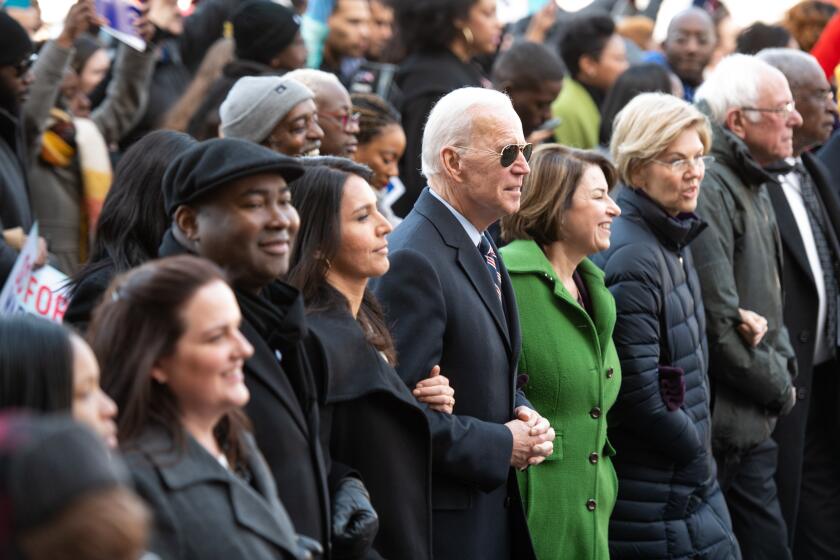Can Elizabeth Warren beat Trump? Katie Porter points to her own Orange County win to make the case

CEDAR RAPIDS, Iowa — There’s no shortage of politicians flitting around Iowa these days, as pre-caucus politicking hits its peak. But Rep. Katie Porter wants to make one thing clear: She’s not like the others.
It’s evident from her opening anecdote, which she delivers at school gym rallies and living room gatherings as a top surrogate for Sen. Elizabeth Warren. Her audiences, familiar with political tourists, chuckle when she describes her (unnamed) congressional colleagues announcing with childlike wonder that they’re headed to Iowa “for the first time!”
Before a Cedar Rapids house party, she flashed a conspiratorial grin: “Suckers! They’re gonna be so cold.”
It was an incongruous punchline coming from a woman whose Irvine congressional district was, at that moment, nearly 40 degrees warmer — and that was the point. Porter’s pitch is rooted not just in who she is — a first-term Democratic congresswoman from Orange County — but also who she was — a daughter of rural Iowa who made it to Harvard Law School and a front-row seat in then-professor Warren’s bankruptcy law class nearly 20 years ago.
The Warren campaign is wagering that Porter’s blend of Hawkeye bona fides and long history with her candidate will persuade caucusgoers who may like the Massachusetts senator but worry about her general election prospects. Porter, an unabashed Warren acolyte from a swing district, tackles those electability fears head-on, even as political opponents back home hope to use her endorsement against the senator.
“She’s Orange County-Iowa,” said Dan Newman, a Democratic strategist who worked on Porter’s 2018 campaign. “There’s not a lot of Orange County-Iowa.”
Elizabeth Warren, who has been consistently dogged by doubts about her electability, is making a more explicit gender appeal in the final weeks before the Iowa caucuses.
Porter, 46, was born in Fort Dodge, Iowa, and grew up on a farm in Winterset. Her stump speech recalls when the rural town’s bank closed during the farm crisis of the 1980s, sparking her interest in consumer protections.
The anecdote offers an easy transition to Warren’s emphasis on consumers, but Porter makes clear that their bond goes deeper than shared ideology.
“I should just disclose: I have three children. None of them are named Joey, Peter or Bernie,” she told an audience over breakfast bites in an Iowa City living room. “But I have a daughter named Elizabeth.”
Porter met her daughter’s namesake in the fall of 2000, when she was a third-year law student at Harvard. Since then, Elizabeth, as Porter exclusively calls her, has been a research partner and political mentor. (The first-name basis, Porter said in an interview, began “after I graduated — definitely not until after I graduated.”)
Still, Porter did not immediately back Warren’s presidential bid. For months, speculation mounted over whether she would endorse Warren or California Sen. Kamala Harris, who as state attorney general appointed Porter to oversee a $25-billion settlement with the nation’s top banks.
When she finally made her choice in the fall, she called her mentor on the phone.
“I said, ‘Elizabeth, if you’ll have me, I would like to endorse,’” Porter said, which Warren cheerfully accepted. “And then I said, ‘I’ve missed you a lot.’ And she said, ‘I’ve missed you too.’”
Porter made the endorsement public in late October.
Since then, she’s made three trips to Iowa, with a fourth planned for the Feb. 3 caucuses. She acts as a warm-up emcee at Warren rallies. She cheerleads volunteers preparing to knock on doors in the bitter wind, doling out custom-made nail polish in the campaign’s “liberty green” and revealing that Warren likes to paint her toes wacky colors.
And she twists arms of undecided voters, in group settings and one-on-one. Kurt Meyer, who chairs the Democratic Party in three rural counties, said Porter spent most of their lunch in Mason City comparing mutual acquaintances and sharing personal memories of Warren before turning to the hard sell.
“She was the closer,” Meyer said. “She was to make sure that Kurt Meyer understood in a profound way that the Elizabeth Warren team wants him to get off that picket fence he sits on somewhat uncomfortably and join Team Warren.” He publicly endorsed Warren a week later.
Porter’s barnstorming is infused with nostalgia. She detours to drive by the Coralville house she lived in as a University of Iowa law professor, proudly noting the wooden fence she built by herself is still standing in fine shape. Her events are dotted with familiar faces — former colleagues, her old hairdresser, her dad.
Those who don’t know Porter personally often know of her, familiar with the now-viral congressional hearing interrogations of JP Morgan Chase Chief Executive Jamie Dimon and Housing Secretary Ben Carson. She has emerged as one of the higher-profile members of the freshman class of House Democrats, a group that has been unusually coveted as surrogates this cycle.
The alliances have largely fallen along predictable ideological lines: moderates who ousted Republicans from swing seats, such as Rep. Abby Finkenauer of Iowa, are backing former Vice President Joe Biden, while progressive firebrands from deep-blue districts, such as New York Rep. Alexandria Ocasio-Cortez, have sided with Vermont Sen. Bernie Sanders. Both candidates deployed their prominent freshman surrogates on the trail in Iowa this weekend.
Warren’s other major first-term endorsers — Reps. Ayanna Pressley of Massachusetts and Deb Haaland of New Mexico — occupy reliably Democratic seats. But Porter defies that trend. Her district is hardly a liberal bastion — she is the first Democrat to represent that patch of Orange County since the 1930s, and registered Republicans still outnumber Democrats by a margin of roughly 17,000.

Porter ran in 2018 to unseat incumbent GOP Rep. Mimi Walters with Warren’s encouragement and endorsement; the Massachusetts senator featured prominently in her campaign advertising.
“She had a tight primary. She had a tight general,” Newman said. “She had a really tough district. It was considered to be on the bubble of being a lost cause going in.”
Porter made a few breaks from the left, such as opposing a hike in the state gas tax, but her message largely echoed that of Warren’s in blasting the influence of money in politics. She won by 4 points.
Now, Porter is trying to convince Iowans, desperate for a Democrat who can beat President Trump, that if a Warren-style campaign can succeed in Orange County, it can succeed elsewhere.
“I just offer you proof that you can win on the policies that you believe in, and that are authentic to you and your experience and that speak to your community, anywhere in the country,” she said in Iowa City.
Republicans, meanwhile, are ready to pounce on Porter’s Iowa field trips. One email blast from the Orange County GOP accused her of “championing Warren’s extreme agenda to raise your taxes and end your private healthcare options.” Another missive from the National Republican Congressional Committee pointedly posed the question, “Is Katie Porter running for Congress in Iowa?”
Mike Moodian, a political commentator and professor at Chapman University in Orange, said the association with Warren may affect Porter’s reelection prospects some, although she would probably be helped by Trump’s unpopularity in Orange County.
“It could be a bigger problem for her maybe down the road, when Donald Trump isn’t on the ballot,” he said.
`Porter brushes off critiques of being an absentee congresswoman, noting she’s had a dozen town halls in the district. And to hear her tell it to Iowans, this is exactly where her constituents want her to be.
“My constituents in California — they know why I’m here in Iowa this weekend and not with them,” she said in Cedar Rapids. She rattled off a list of domino effects that would come from a Warren win in Iowa: momentum to tackle corruption, prevent gun violence deaths, tackle climate change and other liberal priorities.
“I’m so proud to be an Iowan this weekend,” she continued. “I will be really proud to be an Iowan on Feb. 3.”
More to Read
Get the L.A. Times Politics newsletter
Deeply reported insights into legislation, politics and policy from Sacramento, Washington and beyond. In your inbox three times per week.
You may occasionally receive promotional content from the Los Angeles Times.












